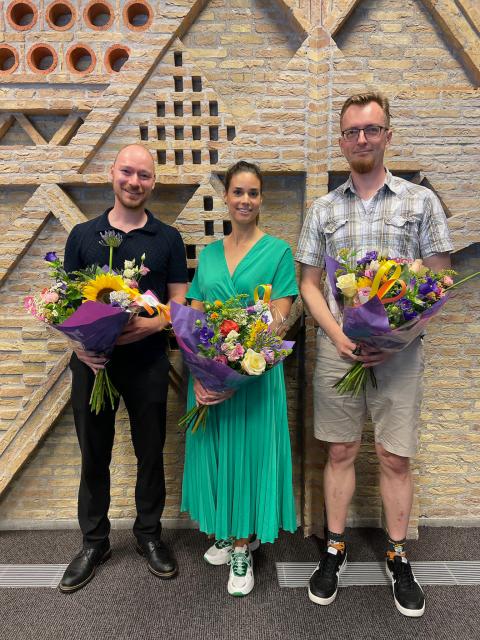Winners of the HSRI Cross-Cutting Theme PhD Call of 2023
We proudly present the winners of the HSRI cross-cutting theme PhD call of 2023. It is the fourth year that HSRI invited researchers of the Tilburg Schools of Behavioural and Social Sciences (TSB) to participate in an open competition for a total of 3 PhD projects, to foster cross-departmental collaborations and interdisciplinary within TSB in line with the three cross-cutting themes: Adaptive societies, organization and workers, Personalized prevention and care & Healthy lifespan.
In total, thirty-four proposals of very high quality were submitted: Adaptive societies, organization, and workers (n=10), Personalized prevention and care (n=14) and Healthy lifespan (n=10). We would like to thank all applicant for taking the initiative to apply for this call.
Each proposal underwent rigorous evaluation by two expert external reviewers, well-versed in multidisciplinary research. The result? The TSB Management Team has chosen to support the top-ranked proposal in each category. Join us in celebrating these forward-thinking researchers and stay tuned for their groundbreaking contributions to the field. In the following, we highlight the applicant of the top 5 of each of the cross-cutting themes.
Adaptive societies, organization and workers:
- Effect of stereotyping on decision making of professionals working with victims of honor-related violence [Roeg, Bender, van de Mheen, van Dijk, van Doorn, van Osch (Tranzo, SP, OS, External)]
Abstract. Dutch professionals (police, health care) often lack knowledge about honor-related violence, leading to reliance on stereotypes about victims, enhancing stigma and discrimination. We investigate stereotype impact and how to improve victim-related attitudes and behaviors of professionals. - Healthy, happy, working new mothers: The interplay of parental leave, employment transitions, and health trajectories [Kühn, Burgos Ochoa, Turek, Vermunt (Soc, MTO, HRS)]
- „Work & Worries”: studying today’s work-family-balance and burnout in employees at risk due to care for a special needs child [van Bakel, Pak, Dirks, Jongerling (Tranzo, HRS, MTO)]
- It is not all about the destination: Developing and examining ongoing process evaluation of occupational health interventions [van der Elst, Dejonckheere, Oostrom (SP, MCP)]
- Migrating to the Netherlands: The role of context, personality and cognition in achieving Dutch Language proficiency [Smalle, De Baene, Vroomen, Bogaerts (DP, CNP)]
Personalized prevention and care:
- Deep learning and understanding of fatigue in colorectal cancer patients: A computational bio-medical psychology approach (DeFaCT-study) [Schoormans, Van Deun, Mols (MCP, MTO)]
Abstract. Understanding why colorectal cancer patients become and remain fatigued is essential in providing personalized care. Concurrent to the multidisciplinary character of fatigue, we need to obtain data from the psychological, medical, and biological discipline. Developing advanced statistical software will enable thorough understanding of fatigue examining associations within and across disciplines. - A wearable eye-tracking study on the role of gaze behavior in affective parent-child communication [Holleman, Chhangur, Vroomen (CNP, DP)]
- Culturally sensitive strengths-based Intervention for Ukrainian refugees [Hendriks, Bender, Kroon (DP, SP, HRS)]
- The yin and yang of health: understanding the role of social inequalities in the interplay between objective and subjective health for tailored patient prevention and care [Loter, van de Mheen, Birke (MTO, Tranzo)]
- Early detection of anxiety and depression in adolescents transitioning to high school: The detection and individualized prevention (DIP) project [Ikani, Everaert, Smeets (DP, MCP)]
Healthy lifespan:
- Identifying and Bolstering Emotional Resources for Daily Cognitive Functioning Across the Adult Lifespan [Klaiber, Pekaar (DP, HRS)]
Abstract. As societal changes require people to work longer in cognitively demanding jobs, they need effective resources to maintain their cognitive functioning. This project will take a within- person approach to (1) identify age-specific daily emotional resources that can buffer cognitive demands and (2) design a personalized intervention to enhance such resources. - Multitasking and Adjusting: Social and Psychological Consequences of the Changing Landscape of Women’s Retirement Pathways [Turek, Kühn, Brehmer (HRS, SOC, DP)]
- The Implementation, Evaluation, and Longitudinal Assessment of a Strength-Based Intervention on Elementary School Children in the Context of Social Inequalities [Brehmer, Loter (DP, MTO)]
- Flexible cultural patterns: How ethnic minority adolescents navigate daily multicultural social worlds and implications for health and well-being [Hillekens, Bender, van Egmond (DP, SP, Tranzo)]
- What is self-esteem and how is it related with psychological wellbeing? [Nyclíček, van Roekel, van Assen (MCP, DP, MTO)]

